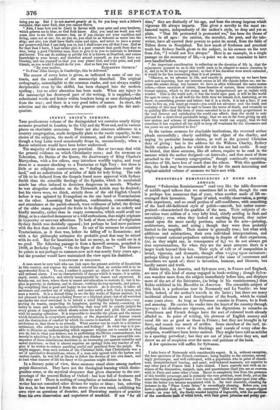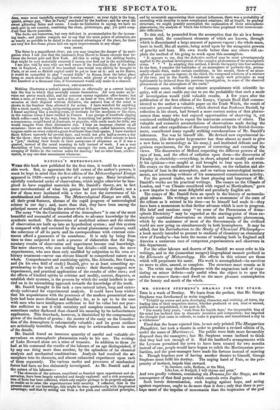PEDESTRIAN REMINISCENCES AT HOME AND ABROAD.
THESE "Pedestrian Reminiscences" read very like the table discourses of middle-aged talkers that we sometimes fall in with, though the race is perhaps less numerous than of yore, when another mode of life en- couraged their formation. Vigour of mind, worldly observation, a pretty wide experience, and no small portion of self-confidence, with something of the hard old-fashioned style of polish—smooth, but rather coarse- grained—characterized the qualities of the men. Their subjects of ob- servation were seldom of a very lofty kind, chiefly settling in flesh and materiality; even when they looked at anything beyond, they rather seized upon the more earthy portions, unless in the arts—painting, architecture, music, and acting ; though they were then probably limited to the tangible. Their matter is generally true; but what with additions and subtractions, their own individual interpretations, and deeply-seated national prejudices existing in despite of their experience, (or, as they might say, in consequence of it,) we do not always get true representations, for when they are the most accurate there is a larger truth beyond their ken. Their style of talk or of composition is broad, vigorous, and dramatic, though often verging upon caricature: perhaps Gilray is not a bad counterpart of the class of raconteurs and describers we speak of; there is invention, humour, and likeness, but hardly nature and truth. Rubio lately, in America, and Sylvanus now, in France and England, are men of this kind of stamp engaged in book-writing ; though Sylva- nus wanders more from the subject immediately before him, and displays more of the art of the litterateur, (to bring in his reminiscences,) than Rubio exhibited in his Rambles in America. The ostensible subject of this book is a pedestrian tour in Normandy and La Vend& : we hear little, indeed, of the author's travels in the latter; but there are many incidental allusions to and descriptions of the South, which he visited some years since. As long as Sylvanus remains in France, he is fresh and amusing. He carries his reader into the heart of the country through byways : his sketches are vigorous, and his digressions to remarks on Frenchmen and French doings have the sort of coloured truth already alluded to. In point of writing, his pictures of English scenery and rural life are as good as those in France ; but they are brought in by force, and smack too much of artifice. Some sketches of the turf, in- cluding dramatic views of its blacklegs and rascals of every other de- scription, would have been better omitted. They might have told as articles in a sporting periodical ; but they are out of place where they are, and throw an air of suspicion over the more real portions of the book.
A few specimens will suffice for Sylvanus.
HAVRE.
I take leave of Normandy with considerable regret. It is, without exception, the best specimen of the French continent; being healthy in the extreme, exceed ingly picturesque, and well cultivated, with a population who in point of cleanli- ness, straightforward bearing, and quiet, well-behaved manners, are superior to any other part of France that I have visited. I have scarcely met with an in- stance of the diminutive, waspish, vain and quarrelsome Gaul you are so overrun with in Paris and some other places. Havre is completely free from the presence of this terrible personage, and is certainly the very prettiest, most lively, yet at the same time tranquil seaport town I ever was in, and one that gains upon your affec- tions the better you become acquainted with it. Its tout ensemble, standing for instance in the "Place Louis Seize," is exceedingly pleasing. Before you, you have a splendid dock, or " bassin du commerce," filled with fine square-rigged vessels: on your left, the finely-wooded heights of Ingouville, with the pavilions of the merchants bat of white brick, with their green jalousies and pretty gar-
dens, some most tastefully arranged in every respect: on your right is the long, quaint, always gay, "Rue de Paris," concluded by the harbour; and far away the sweet glittering Seine and ocean. I make no hesitation in saying, we have no such port in our country, combining the clean, picturesque, gay, yet quiet coup- d'ceil that Havre possesses. The docks are numerous, but very deficient in accommodation for the increas- ing trade; and justice compels me to say that the main points of attraction are as nearly as possible to be dated to the natural advantages of the place, for there are very few five-franc pieces laid out upon improvements in any shape.
THE SEINE.
The Seine is a magnificent river; yet you may imagine the danger of its navi- gation when I tell you that the insurance from Havre to Rouen exceeds that be- tween the former port and New York. All this is owing to the shifting banks, that might be very materially removed if money was laid out in the undertaking. I am also told by men who are well aware of its feasibility, that if the Seine was in England, a vessel of two hundred tons would very shortly be brought to Paris, or as soon as British capital could be got to bear on it: and as for Havre, it would be compelled to play " second fiddle " to Rouen, from the latter place being so much nearer the capital and interior, with plenty of water for ships of five hundred or a thousand tons, if Government would only make it a channel.
NATIONAL AMUSEMENTS.
Nothing illustrates a nation's peculiarities so effectually as a correct insight into the way in which they severally amuse themselves. All men make an in- voice out pretty much alike, and the common enemy regulates office-hours; but when a man, or twenty, have each a day, or an hour or two, with means for the occasion at their disposal without dictation, the natured bias of the mind is shown in the freedom thus allowed it for action. I have watched for anything like a rural, manly, rough, invigorating game or field-sport here, in vain; nor have I found anything like a reading-room, or institute for the mechanic or his class, in the various towns I have resided in France. I see groups of hundreds sipping black coffee—and, by the way, brandy too, in anything but petits verres—playing a monotonous, stupid hand at dominoes, or piquette, with cards made for dolls, one would imagine from their diminutive size. I hear an immense chatter on all occasions: there are three fellows now under my window, tailed labourers, whose tongues rattle on every subject a great deal faster than their spades. I have watched these fellows narrowly for several days, and would not give half-a-crown a day for the three: they lean on their pickaxes and shovels every third minute to have a "jaw," shaking their hands in their paroxysms of eloquence as if it was a quarrel, instead of the usual yearning to talk instead of work. I see a vast flourishing of hats,. loathsome salutations amongst the men, and hear a great scraping of fiddles in the various salles for dancing: but no otter-hunt, cricket- match, or any out-door amusement whatever.



























 Previous page
Previous page